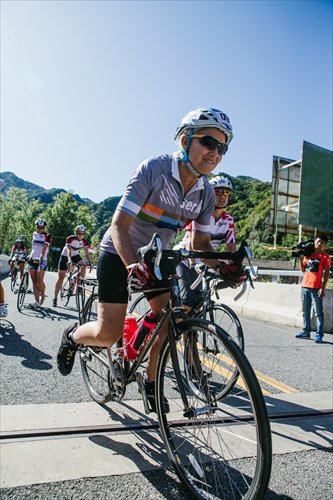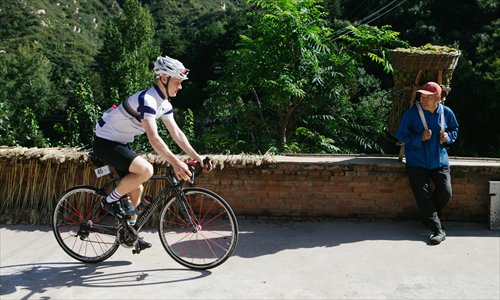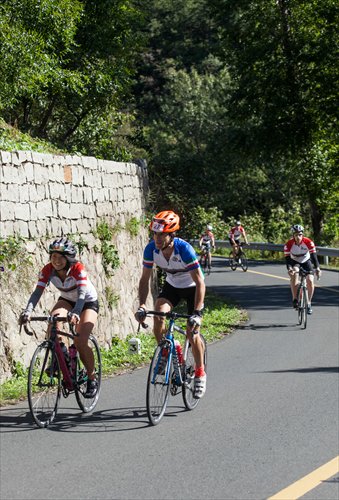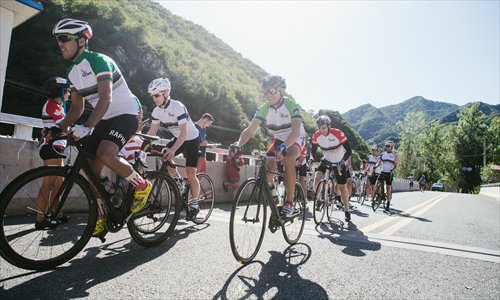Paddling enthusiasm
Beijing expats cycle to promote green lifestyle

A total of 69 foreign cyclists from 18 countries participated in the first Beijing Laowai Cycling World Championships. Photo: Li Hao/GT
Raul Franco, a 24-year-old Mexican who has been living in Beijing for three and a half years, paddled hard on his bike up a country road in Wudaohe village, Huairou district. His shirt was soaked with sweat and his legs were aching from paddling, but he couldn't stop as he was trying to win the championship.
Franco was participating in the first-ever Beijing Laowai Cycling World Championships held last Saturday. A total of 69 amateur expat enthusiasts from 18 countries, including the US, the UK, and Italy, cycled in Huairou district.
There were expats who just arrived in Beijing for a few months and those who had been here for decades, with their age ranging from 20 to 60.
"I had expected about 50 people to participate. So it met my expectations," said the organizer, Shannon Bufton from Australia.
He said he hosted the cycling championship on the same day as the UCI (Union Cycliste Internationale) Road World Championships held in the US to give the foreign cycling enthusiasts an opportunity to get a feeling of being part of an international event. But the event mainly aims to encourage more people to lead a green life through cycling.
Susanna Hasse, a 38-year-old teacher from Germany, said that Beijing's traffic is already very congested and the air quality is not so good. "If more people choose to cycle, these problems can be eased and people can lead a more green and healthy life."



Foreign cyclists believe Beijing is cycle-friendly in general. Photos: Li Hao/GT
Vehicle of green life
The championship had two courses, a 67-kilometer hilly course with approximately 1,600 meters of climbing for men, and a 42-kilometer flat course for women.
To allow more common people to join the competition, Bufton tried to lower the bar for the participants by earmarking some bonus points. Older people, overweight ones, and those who have children (because they might have little time on workout every day), those who had stayed in Beijing for years (considering they have been exposed to Beijing's polluted air for long and their lung capacity might have been reduced), and the vegetarian (because they choose environment-friendly lifestyle, as well as might have less strength for not eating meat), were qualified for "bonus points" for getting an early start.
"I want to let different types of people enjoy the sport without worrying too much about being left behind in the race, so as to encourage more people to cycle," Bufton said.
David Wales, a 55-year-old software engineer from the UK, got an 11-minute early start for being senior and, in his words, "carrying a bit of extra weight."
"The set up is really fair. Let's face it, I can't compete with 20-year-olds anymore, but with the bonus points, everyone should be at the finish line around the same time, with no one being embarrassed about the results," he said.
Wales used to play rugby when he was young, but he quit when he got older since his body couldn't cope with such intensive and demanding activities.
"But cycling is a sport for everyone. Normally one will not strain or hurt his body in cycling, while getting sufficient exercise from it," he said.
Wales finished 37th in the race, and was only 30 minutes behind the champion.
Experiencing local culture
For Franco and many other foreign cyclists, cycling is not only a way to challenge their bodies, but also the best way to experience local culture.
Unlike traveling in cars in an enclosed space and moving at above 100 kilometers per hour, the bikes run at 20 to 30 kilometers per hour, and one can be more involved in surrounding things and stop whenever he wants, Franco said.
While cycling along the country road this Saturday, Franco witnessed the leisurely life of the rural people.
"The farmers were plowing the ground in the field. Some people were eating lunch in their yard and smoking at the doorstep with their neighbors," Franco said.
"You can't see that in the city or by driving a car in the countryside. Cycling can get you so close to the local people," he said.
Sidonie Kade, an architect from Germany and winner of the women's race, shared the feeling of Franco. "When cycling in the suburbs of Beijing, you can see the Great Wall along the mountains. It's amazing, you can't have this experience in any other country around the world."
As an architect, Kade is very excited to see the different sections of the Great Wall.
"The section of the Great Wall we can see today in Huairou is Mutianyu Great Wall. It was built in Ming Dynasty (1368-1644) and famous for its many beacon towers," Kade pointed at the Great Wall while cycling. "You can actually smell and feel the culture in the air while cycling," she said.
Space for improvement
Bufton said that Beijing is a good place for cycling in general because the road pavement is good in both city and suburbs, which is ideal for cycling. But for him, what's not so great is the driving habit here.
"Drivers would just park their cars by the roadside or turn around unexpectedly, which is quite dangerous for the cyclist," he said.
Franco said that cycling in the city feels like being in a video game.
"I have to avoid many barriers in order to make a breakthrough and get home," he said.
"The problem is that the city has too many cars, so if the city wants to encourage more people to cycle, they should build more cycle lanes and strictly prohibit cars entering the lane."
Besides, it's not just about cars, Franco added. People ride or drive the wrong way and cross the streets without looking. "Some people are not conscious about the high speed that we are going at. And in fact we can't brake as fast as a car does. It's not safe for the cyclists and pedestrians alike," he said.
Having cycled in the US before, Franco said most cities in the US have cycle lanes, and on the roads that have a lot of cyclists or well known for good riding, there would be a lot of signs asking drivers to be careful about cyclists and keep a two-meter distance.
"In the 1980s, Beijing was a city full of bicycles - the biggest bicycle city the world has ever seen. I believe that the driving culture will flourish again," Franco said.
"The conditions here now are right - a big city so close to excellent cycling terrain, an interest in recreation and health by more and more Chinese, and globally the trend is that cycling is booming," he said. "People say that cycling is the new golf."